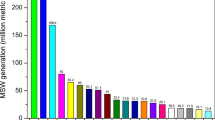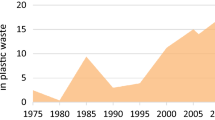Abstract
Goal
This research aims to assess the environmental effects of integrated strategies in a municipal waste management system. In particular, analysis is focused on a waste stream in Palermo, where landfill involves the prompt disposal of the most waste after collection. The current local management system is compared with two integrated waste management alternatives. Both the options comply with Italian regulations, but each one predicts adopting the available technologies in different ways.
Methods and objectives
Energetic and environmental balances are carried out in each management system referring to local waste composition in order to quantify energy consumption, the recovery of material and energy, and the environmental releases. Impact assessment is carried out to define the environmental profile of each option. Impact categories are defined and inventory data, by means of a suitable aggregation, can be used to evaluate the potential contribution that system inputs and outputs could bring to the relative category.
Results
In opposition to the current management, which involves energy balance at a loss, the mass and energy balances outcomes in both of the two hypothetical management systems show the capability to obtain energy and material recovery to a substantial extent. Sorted collection plays a remarkable role in the improvement of environmental performance of management systems. In particular, the thermal treatment of waste associated with energy recovery, and the concomitant material recycling, increase the saving of energy.
Conclusions
Environmental pressure factors of the management system are assessed depending on the relevant consumption of raw materials and energy, and on the emission of pollutants. The resulting figures reflect the two different integrated management options as being sustainable solutions for achieving an improvement in environmental performance, which is based on increasing the value of waste, as an alternative to resources, and the reduction of environmental releases. Life Cycle Assessment of municipal waste management systems can be usefully applied to define synthetic indices of environmental impact. These indices could single out possible alternatives in multi-criteria analysis, together with economic and technical parameters.
Similar content being viewed by others
References
Badino V, Baldo GL (1998): LCA. Istruzioni per l’uso. Progetto Leonardo, Esculapio Editore, Bologna
Beccali G, Cellura M (1995): Life Cycle Assessment e processi decisionali. La Termotecnica, Marzo, 31–40
Beccali G, Cellura M, Mistretta M (1999): La vita dei rifiuti urbani a Palermo. Parte 1: Ecobilancio. GEA, XII, 6, 42–53
Beccali G, Cellura M, Mistretta M (2000): La vita dei rifiuti a Palermo. Parte 2: Analisi degli impatti. GEA, XIII, 1
Boustead I (1992): The relevance of reuse and recycling activities for the LCA profile of products. Proc. 3rd CESIO International Surfactants Congress and Exhibition, London, 218–226 Italian Legislative Decree N.22, February 5 (1997): Attuazione delle direttive 91/156/CEE, 91/689/CEEe 94/162/CEE. Supplemento della Gazzetta Ufficiale n.38 del 15/2/1997
ERRA (1993): Waste analysis procedure. Reference report of the ERRA Codification Programme. Available from European Recovery and Recycling Association, 83 Ave E. Mounier, Box 14, Brussels 1200, Belgium. Reproduced, with permission, as Appendix 2
ETSU (1992): Production and combustion of cRDF for on-site power generation. Energy Technology Support Unit report no. B 1374, by Aspinwall and Company Ltd. Published by the Department of Trade and Industry, p. 66
Habersatter K (1991): Oekobilanz von Packstoffen, Stand 1990. Bundesamt fur Umwelt Wald und Landschaft (BUWAL), Report No.132, Bern, Switzerland
Heijungs R et al. (1992): Environmental Life Cycle Assessment of products. I: Guide. National Reuse of Waste Research Programme (NOH). Centre of Environmental Science, Leiden NL, October, pp.95
Heijungs R (1996): Provisional method for the assessment of the toxicological impacts. Centre of Environmental Science, Leiden NL
Morita Y, Tokuda M (1998): Life Cycle Assessment of Waste Management: A Case Study for City of Sendai. Proceedings of the Third International Conference on Ecobalance, November 25–27, Tsukuba, Japan, 513–516
ORCA (1992): Information on Composting and Anaerobic Digestion. ORCA Technical Publication No.l. Organic Reclamation & Composting Association, Brussels, p. 74
Tamamushi K, White PR (1998): Applying of Life Cycle Assessment to Waste Management in Asia. Proceedings of the Third International Conference on Ecobalance, November 25–27, Tsukuba, Japan, 501–504
Tanaka M, Osako M, Fuji T, Saito A, Sugiyama R, Kurihara K (1998): A Study on Comparison of Municipal Solid Waste Management Alternatives Based on Inventory Analysis. Proceedings of the Third International Conference on Ecobalance, November 25–27, Tsukuba, Japan, 497–500
Thorneloe SA,{au{fnWeitz} {gnK}}, {au{fnNishtala} {gnS}}, {au{fnBarlaz} {gnM}}, {au{fnRanjithan} {gnR}}, Ham RK (1997): Strategie integrate di gestione dei rifiuti. Ricicla, 97, Rimini, 229–235
Valentini A (1997): Valutazioni economico- ambietali del ciclo di vita dei rsu. Gea, X, 6, 46–67
White PR, Franke M, Hindle P (1995): Integrated Solid Waste Management: A Life Cycle Inventory. Blackie Academic & Professional, Glasgow, 345
Author information
Authors and Affiliations
Corresponding authors
Rights and permissions
About this article
Cite this article
Beccali, G., Cellura, M. & Mistretta, M. Managing municipal solid waste. Int J LCA 6, 243–249 (2001). https://doi.org/10.1007/BF02979380
Received:
Accepted:
Issue Date:
DOI: https://doi.org/10.1007/BF02979380
Keywords
- Case studies
- compost
- eco-balance
- energy recovery
- environmental releases
- functional unit
- impact categories
- integrated management systems
- Life Cycle Assessment
- material recovery facilities
- material recovery rate
- municipal waste management
- net energy consumption
- refuse-derived fuel
- synthetic indices
- waste valorization




